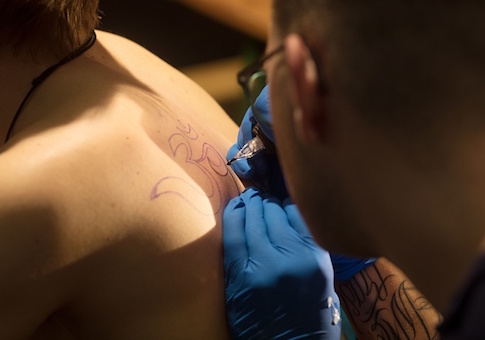A provision in Gov. Mike DeWine’s budget proposal would require a $250 licensing fee for tattoo artists and body piercers, ear piercing excluded. The fee would be a per-person fee, not a per-facility fee.
The provision also would make training requirements more uniform and subject to state oversight. Although the state does not license body artists, Ohio already requires certain levels of training, which are enforced at the local level by health departments.
The Ohio Department of Health has been pushing for a more centralized and uniform approach to these regulations for years. But despite citing health concerns as the primary motivation, the department does not have any numbers suggesting a health epidemic stemming from either qualified or unqualified body artists.
J.C. Benton, the assistant communications director for the Ohio Department of Health, was unable to provide numbers, but rather gave a handful of anecdotal examples of people who illegally performed these jobs outside of approved facilities or by unqualified practitioners.
Benton said that there is a serious problem with body art being done outside of approved facilities and of microblading being done by people who were not qualified. He cited an example of a 10-year-old being tattooed by a 16-year-old, a case that is currently under investigation. In another example, he said a woman who had microblading done poorly, which is meant to tattoo eyebrows on a person.
He said that the governor’s provisions, which would require licensing and statewide training standards, would give the state authority to enforce the law and ensure public safety in the growing industry. He also said that the industry has supported mandatory licensing.
"Body art is a permanent modification to the body that involves needles going under the surface of the skin and injecting ink," Benton said. "It is in the best interests of public health to ensure that individuals doing this work are properly trained."
Benton said that the additional costs might cause people to think longer about entering into the industry, but that the industry is already expensive as it is.
Greg Lawson, a research fellow at the Ohio-based, free-market Buckeye Institute, said in an email that this kind of regulation is not as egregious as some other licenses in the state because of the public health factors involved. But, he said that the issue could be overblown by the department if they fail to provide evidence of a serious health problem.
"Given that tattooing could involve the transfer of blood, this is a bit more sensitive from a public health perspective," Lawson said. "However, unless there is data showing a recent outbreak of disease, I question the need for jumping all over this now."
This fees associated with the license is expected to generate $500,000 in additional revenue, according to Cleveland.com.
